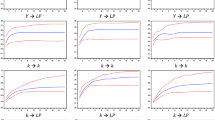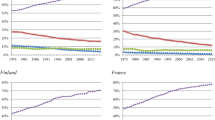Abstract
This paper emphasizes the role of market power, in both product and labor markets, in determining the labor share of income in the Korean economy. It presents an efficient bargaining model incorporating imperfect competition in product markets. This model shows how capital-labor substitution due to capital-augmenting technological progress or other factors, and changes in markups and the bargaining power of workers affect the labor share. Empirical analyses show that there is little support for explanations based on capital-labor substitution. Furthermore, a structural vector autoregression (VAR) model is proposed that can identify the effects of changes in markups and the bargaining power on the labor share. The VAR model applied to the period since the early 1980s demonstrates that both changes are influential, and especially for the manufacturing sector, long-run movements of the labor share are explained almost equally by variations in the markup and bargaining power.
Similar content being viewed by others
References
Acemoglu, D.: Labor- and capital-augmenting technical change. J. Eur. Econ. Assoc. 1(1), 1–37 (2003)
Arnsperger, C., de la Croix, D.: Wage bargaining with a price-setting firm. Bull. Econ. Res. 42(4), 285–298 (1990)
Bentolila, S., Saint-Paul, G.: Explaining movements in the labor share. Contrib. Macroecon. 3(1), 9 (2003)
Blanchard, O.: The medium run. Brook. Pap. Econ. Act. 2, 89–158 (1997)
Boulhol, H.: The convergence of price-cost margins. Open Econ. Rev. 19, 221–240 (2008)
Cho, T., Kim, J., Schreyer, P.: Measuring the evolution of Korea’s material living standards 1980-2014. J. Prod. Anal., July 2014 (2014)
Conyon, M.: Labour’s share, market structure and trade unionism. Int. J. Ind. Organ. 12, 117–131 (1994)
Cowling, K., Molho, I.: Wage share, concentration, and unionism. Manch. Sch. 50(2), 99–115 (1982)
Cowling, K., Waterson, M.: Price-cost margins and market structure. Economica 43, 267–274 (1976)
Devereux, M., Lockwood, B.: Trade unions, non-binding wage agreements, and capital accumulation. Eur. Econ. Rev. 35, 1411–1426 (1991)
Dickson, V.: Conjectural variation elasticities and concentration. Econ. Lett. 7, 281–285 (1981)
Elsby, M., Hobijn, B., Sahin, A.: The decline of the U.S. labor share. Brook. Pap. Econ. Act. Fall 2013, 1–52 (2013)
Fisher, J.: The dynamic effects of neutral and investment-specific technology shocks. J. Polit. Econ. 114(3), 413–451 (2006)
Gali, J., Gertler, M.: Inflation dynamics: a structural econometric analysis. J. Monet. Econ. 44, 195–222 (1999)
Gollin, D.: Getting income shares right. J. Polit. Econ. 110, 458–474 (2002)
Grout, P.: Investment and wages in the absence of binding contracts. Econometrica 52(2), 449–460 (1984)
Henley, A.: Trades unions, market concentration and income distribution in the United States manufacturing industry. Int. J. Ind. Organ. 5, 193–210 (1987)
Jones, C.: Growth, capital shares and a new perspective on production functions. Working Paper, University of California at Berkeley (2003)
Kalecki, M.: The determinants of distribution of the national income. Econometrica 6(2), 97–112 (1938)
Kalecki, M.: The class struggle and the distribution of national income. Kyklos 24(1), 1–9 (1971)
Karabarbounis, L., Neiman, B.: The global decline of the labor share. Q. J. Econ. 129(1), 61–103 (2014)
Kim, B.: Identifying a permanent markup shock and its implications for macroeconomic dynamics. J. Econ. Dyn. Control. 34, 1471–1491 (2010)
Khan, H., Kim, B.: Markups and oil prices in Canada. Econ. Model. 30, 799–813 (2013)
Leon-Ledesma, M., McAdam, P., Willman, A.: Identifying the elasticity of substitution with biased technical change. Am. Econ. Rev. 100(4), 1330–1357 (2010)
Piketty, T.: Capital in the Twenty-First Century. Belknap Press of Harvard University Press, Cambridge (2014)
Shapiro, M., Watson, M.: Sources of business cycle fluctuations. NBER Macroecon. Annu. 1988, 111–148 (1988)
Van der Ploeg, F.: Trade unions, investment, and employment: a non-cooperative approach. Eur. Econ. Rev. 31, 1465–1492 (1987)
Author information
Authors and Affiliations
Corresponding author
Electronic supplementary material
Below is the link to the electronic supplementary material.
Rights and permissions
About this article
Cite this article
Kim, BG. Explaining movements of the labor share in the Korean economy: factor substitution, markups and bargaining power. J Econ Inequal 14, 327–352 (2016). https://doi.org/10.1007/s10888-016-9330-x
Received:
Accepted:
Published:
Issue Date:
DOI: https://doi.org/10.1007/s10888-016-9330-x




